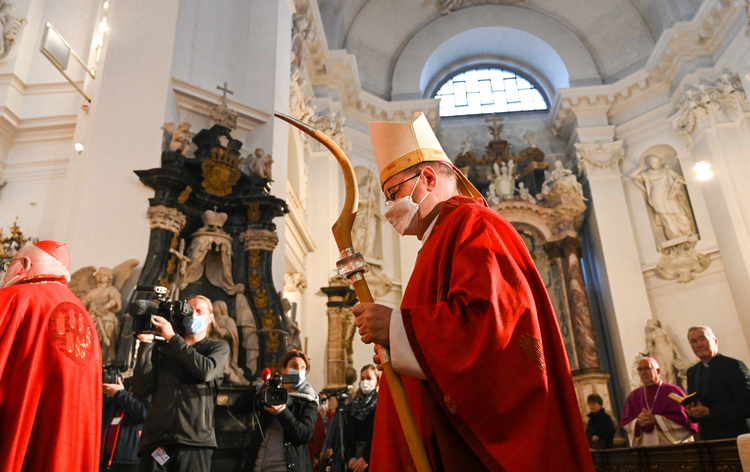[ad_1]
FULDA, Germany (CNS) – The plenary assembly of German bishops began with urgent calls for church reform and a reminder to heed Pope Francis’ warnings.
Conference chairman Bishop Georg Bätzing called on all bishops to embrace radical change, German Catholic news agency KNA reported. He said visible changes were soon needed in the German Synod Path Church’s reform project, which could be a “door opener†for the pope’s worldwide synod process.
Meanwhile, Archbishop Nikola Eterovic, the papal ambassador to Germany, has repeatedly urged bishops to preserve the unity of the Church and follow the pope’s directives.
At the start of the September 20-23 assembly, Catholic reform groups and women’s associations staged protests demanding swift and fundamental reforms, warning that this was the only way for the church to restore its credibility.
Bishop Bätzing called on his fellow bishops to agree that radical changes are needed in the way they work and in their understanding of their ministry. In his opening service sermon, the Bishop of Limburg criticized the way some bishops acted in preparation for September 30 to October 30. 2 Synod Assembly, which is part of the Synod Path, an attempt to revitalize the church and restore confidence following a report commissioned by the church in September 2018 which detailed thousands of cases of sexual abuse committed by the Catholic clergy over six decades.
Bishop Bätzing said that for the upcoming controversial reform debates “the spirit and courage of a turnaround” are needed.
Bishop Georg Bätzing said that the bishops themselves bear a considerable responsibility for the fact that the gospel message they proclaimed was no longer understood in Germany.
KNA reported that he said without a real turnaround, the bishops would not do justice to the impact of the abuse scandal and the drama of the country’s growing secularization. For many in a liberal society, the behavior of bishops thus far was a reason to reject the church’s offer of redemption “as presumptuous, intrusive, and obsolete in view of abuse.”
Bishop Bätzing added that the bishops themselves bore a considerable responsibility for the fact that the message of the Gospel they proclaimed was no longer understood.
Archbishop Eterovic quoted many long quotes from Pope Francis, Saint Paul VI and Cardinal Pietro Parolin, Vatican Secretary of State, in his greeting. But while Bishop Bätzing called for speed, Bishop Eterovic braked. As on previous occasions, he urged bishops to preserve the unity of the Church and accused bishops of not heeding the pope’s warnings to this effect.
Among other things, the nuncio recalled the declarations of Pope Francis about the German bishops: that it was not ill will which animated many of them, but “a pastoral desire” which did not take into account certain directives. necessary of the Pope. An ecclesial community that tries to solve its problems on its own, relying only on its own strengths, its own methods and its own intelligence, could end up making the situation worse, he warned.
German Catholics must remain “firmly united in the unity of the Catholic Church” and must not compromise “the truths of Christian doctrine,” said the papal nuncio.
This does not mean “not to move forward, not to change anything and maybe not even to debate and to be in disagreement”, continued Mgr Eterovic, quoting the Pope. But German Catholics must remain “firmly united in the unity of the Catholic Church” and must not compromise “the truths of Christian doctrine”.
KNA reported that with these remarks Archbishop Eterovic was alluding, without naming specifically, to the Synodal Path, in which bishops and lay people debate controversial issues such as Catholic sexual morality or the role of women in the church. .
Bishop Bätzing said the reform dialogue must quickly bring visible change.
Bishop Bätzing said the reform dialogue must quickly bring visible change. The church in Germany could bring its experience to the global synodal process that Pope Francis will launch in October, Bishop Bätzing added.
At the same time, he admitted that the bishops were distant from each other in some important debates about the reform. However, he said he believed the reform process would lead to clear signs of change, for example on issues of sexual morality. It was important to make the useful knowledge of Catholic sex education available to everyone, including same-sex couples and those who are not married, he said. Catholic sexual morality should not be viewed by people as prohibitive morality.
He also called for greater lay participation in decision-making processes in the church.
Catholic reform groups and women’s associations called on the bishops of Fulda to defend the reforms.
Agnes Wuckelt, federal vice-president of the German Association of Catholic Women, called on the bishops to stop postponing necessary changes. More and more women were turning their backs on church, including many older women, she said. The association was fighting for reforms because “it is also our church, and not just the church of bishopsâ€.
Then listen:
[ad_2]

